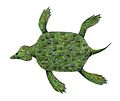| Futabasaurus Temporal range: Late Cretaceous (Santonian) 86.3–85 Ma PreꞒ Ꞓ O S D C P T J K Pg N ↓ | |
|---|---|

| |
| Reconstructed skeleton at National Science Museum, Tokyo | |
| Scientific classification | |
| Domain: | Eukaryota |
| Kingdom: | Animalia |
| Phylum: | Chordata |
| Class: | Reptilia |
| Superorder: | †Sauropterygia |
| Order: | †Plesiosauria |
| Family: | †Elasmosauridae |
| Genus: | †Futabasaurus Sato, Hasegawa & Manabe, 2006 |
| Species: | †F. suzukii |
| Binomial name | |
| †Futabasaurus suzukii Sato, Hasegawa & Manabe, 2006 | |
Futabasaurus is a genus of plesiosaur from the Late Cretaceous of Fukushima, Japan. It was described and named in 2006, and was assigned to the family Elasmosauridae. The genus contains one species, F. suzukii.
Description

Futabasaurus has been estimated over 6 metres (20 ft) in length, possibly within the range of 6.4–9.2 metres (21–30 ft). It can be distinguished from other elasmosaurids by the following characteristics: there is a long distance between the eye sockets and nostrils; the interclavicles and clavicles are fused, and the anterior edge is bent; the humerus is relatively long; and the femora are slim and show prominent muscle scars.
Discovery and naming

Futabasaurus is the first elasmosaurid found in Japan. It was originally known as either "Wellesisaurus sudzuki" or "Futaba-ryu" before publication. The type specimen of Futabasaurus was found in the Irimazawa Member of the Tamayama Formation, in the Futaba Group of Fukushima Prefecture, Japan. The rocks in which it were found date to the Inoceramus amakusensis zone of the early Santonian. The fossils were found by Tadashi Suzuki, then a high school student. Many of the bones of the type specimen show signs of apparent scavenging or predation by sharks, specifically Cretalamna.
The genus Futabasaurus was named after the Futaba Group, in which it was discovered; the specific name is derived from the family name of its discoverer, Suzuki.
The name "Futabasaurus" has also been used for an unrelated theropod dinosaur, from the Late Cretaceous Ashizawa Formation of Japan. However, this dinosaur was not officially named, and remains a nomen nudum.
Classification

The following cladogram shows the placement of Futabasaurus within Elasmosauridae following an analysis by Rodrigo A. Otero, 2016:

| Elasmosauridae |
| |||||||||||||||||||||||||||||||||||||||||||||||||||||||||||||||||||||||||||||||||||||||||||||||||||||||||
See also
References
- ^ Sato, Tamaki; Hasegawa, Yoshikazu; Manabe, Makoto (2006). "A new elasmosaurid plesiosaur from the Upper Cretaceous of Fukushima, Japan". Palaeontology. 49 (3): 467–484. Bibcode:2006Palgy..49..467S. doi:10.1111/j.1475-4983.2006.00554.x.
- O'Gorman, J.P. (2016). "A Small Body Sized Non-Aristonectine Elasmosaurid (Sauropterygia, Plesiosauria) from the Late Cretaceous of Patagonia with Comments on the Relationships of the Patagonian and Antarctic Elasmosaurids". Ameghiniana. 53 (3): 245–268. doi:10.5710/AMGH.29.11.2015.2928. hdl:11336/54311. S2CID 133139689.
- Shimada, K.; Tsuihiji, T.; Sato, T.; Hasegawa, Y. (2010). "A remarkable case of a shark-bitten elasmosaurid plesiosaur". Journal of Vertebrate Paleontology. 30 (2): 592–597. Bibcode:2010JVPal..30..592S. doi:10.1080/02724631003621920. S2CID 128760390.
- Mortimer, Michael (2008). "Neotheropoda". The Theropod Database. Archived from the original on 2013-09-29. Retrieved 2009-11-17.
- Otero, R. A. (2016). "Taxonomic reassessment of Hydralmosaurus as Styxosaurus: new insights on the elasmosaurid neck evolution throughout the Cretaceous". PeerJ. 4: e1777. doi:10.7717/peerj.1777. PMC 4806632. PMID 27019781.
External links
- Futabasaurus at Dinosaurier-Web (German)
| Taxon identifiers | |
|---|---|
| Futabasaurus |
|
This article about a plesiosaur is a stub. You can help Misplaced Pages by expanding it. |






